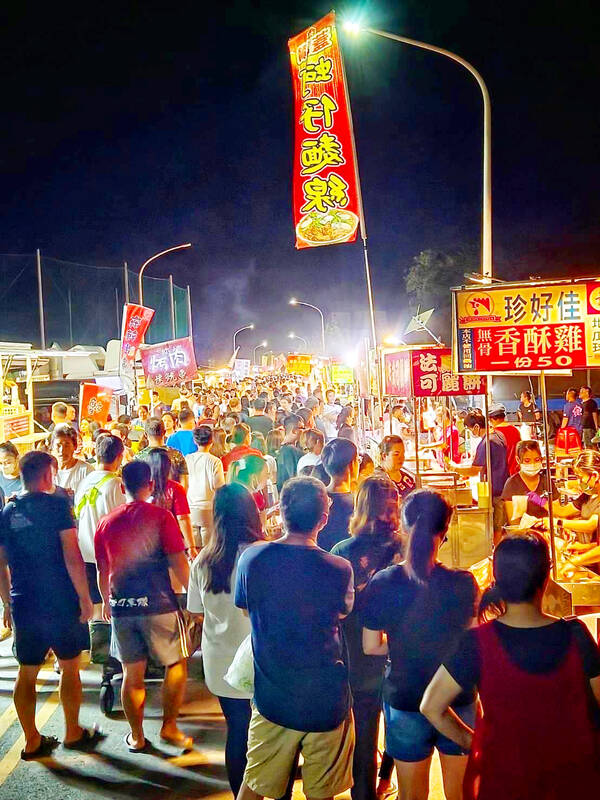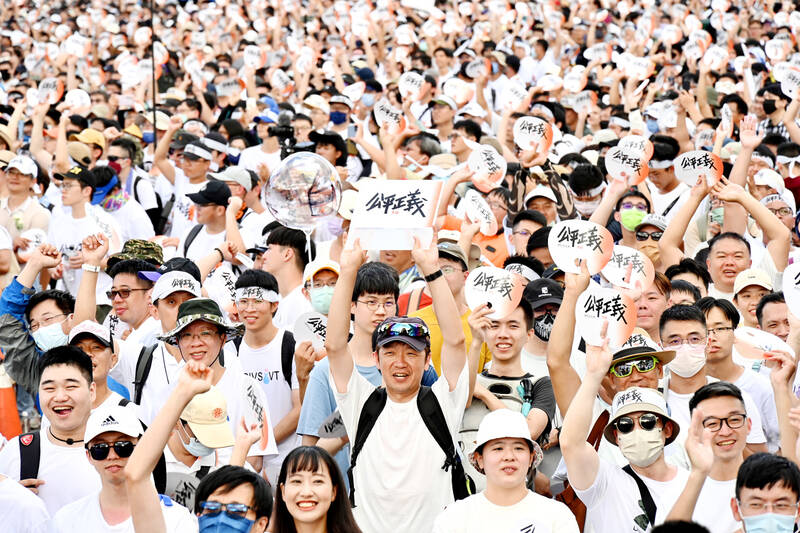The July 16 rally in Taipei at which presidential candidates Hon Hai Precision Industry Co founder Terry Gou (郭台銘), former Taipei mayor Ko Wen-je (柯文哲), New Taipei City Mayor Hou You-yi (侯友宜) appeared, also featured Internet personality Holger Chen (陳之漢), a former gang member turned celebrity known for misogynistic commentary and performative hypermasculinity.
Observers in attendance noted a disproportion of males in the audience and widespread support for Ko. TaiwanPlus News described the event thusly: “Tens of thousands, most of them young Taiwanese men, rallied in Taipei on Sunday calling for housing justice and judicial reform.”
Why men? In recent years many commentators, including the Singaporean transplant Roy Ngerng (鄞義林), have extensively documented the economic difficulties faced by the young in Taiwan: stagnant salaries, skyrocketing housing costs, dead-end service jobs and almost complete government failure to meaningfully address any of the issues. Ngerng has called attention to the combined threat of political polarization and economic inequality: “If the ruling party doesn’t take it seriously, it will put Taiwan’s democracy at risk.”

Photo courtesy of reader
The problem is not just the economy. Social changes in Taiwan since the advent of democratization have left young men adrift.
LOST ECONOMIC MIRACLE
In the heyday of the economic miracle tens of thousands of small factories, organized into clusters like the famed “shoes nest” in Taichung, the bike firms around Dajia or the machine tool cluster in New Taipei City’s Sanchong District (三重), not only churned out products for export, but opportunities for young men to move up. Young males could enter networks of production, learn the business, then start factories of their own by sourcing machines, labor and product orders through these networks.

Photo: Wang Yi-sung, Taipei Times
More than just economic arrangements, these represented dense networks of human connections, with older males mentoring younger males both through the networks in these clusters, and on the shop floor in the actual production process. The loss of economic opportunities and social support when these factories moved to China after the 1990s was a terrible blow to the next generation of Taiwanese males. Even if the manufacturing returns, it will take a couple of generations to rebuild these linkages.
Firms that grew in China also took young people out of Taiwan, and then sent them back, ripping them from the production networks they’d been part of in China and setting them adrift when they returned. Moreover, as I have noted before, large firms in China suppressed the growth of small competitors in Taiwan, making it more difficult for young males to establish new firms. Meanwhile the technology factory production line jobs went to cheap migrant workers.
RELIGION
During the authoritarian era religion was carefully controlled by the party-state, and local religion was a site of both political control and political resistance. Traditionally temples offered numerous roles for socializing young males, many of them involving public performance, such as puppetry and drum troupes, along with paths into local politics. Temple associations were at the center of town life. These paths to socialization for young males have all declined since 1980, when the government began allowing greater religious plurality and a more open society offered more alternatives for young people.
In the early 2000s the government began upgrading the island’s vocational and technology schools and colleges, the “institutes of technology” as they were known, to full-blown universities. The loss to Taiwan was incalculable. For decades young men who did not go to university had studied practical skills of electric, metal and wood work and connected with older skilled males who could mentor them, pass down their skills and knowledge, and steer them into job opportunities. Many of them moved on to start small firms in their own right. All that is gone now.
By contrast, the traditional provinces of females — nursing and teaching — were largely unaffected by these changes.
The authoritarian era also saw the government’s annual round-up of males for a two year sentence in re-education camps, excuse me, military bases, where they were bombarded with Chinese Nationalist Party (KMT) propaganda, despite there being no possible threat from the navy-less People’s Republic of China. Whatever one may think of it, they were also collectively socialized into a shared manhood. Since the 1990s, the length of service has gradually declined, reducing whatever anchor it provided to young males.
AGE OF PRECARITY
Looking at all the changes since the 1990s, it seems like males in Taiwan today are much less likely to be part of productive social networks where they can see an abundance of positive male role models. Moreover, they are more likely to have jobs that are unreliable: we live in the age of precarity, in which individuals have low-paying jobs with few benefits that are always on the edge of being lost.
Precarity in Taiwan’s employment environment began receiving attention after 2008. An excellent CommonWealth Magazine piece from 2009 observed that by some estimates 15-20 percent of all workers were in jobs defined as precarious by the government. Frequently these jobs were in service industries with little prospect of stability of advancement, and many workers did not have health or labor insurance.
After the 2008 economic crisis, globally many firms shifted to the use of temporary office workers, a trend also common in Taiwan. CommonWealth observed that not only did many major firms in the science parks outsource their work to temp agencies, but over 40 percent of state-owned firms followed this practice as well.
This precarity, in addition to its corrosive economic and psychological effects, is pushing the age of marriage up. Young males, when they marry at all, are marrying and having children much later. Hence, they remain single and unattached throughout their critical twenties.
Given these largely negative developments for young males and their place in society, it is almost surprising that there has not been more unrest.
Cheap food? The Internet? Democracy? Low rents? Living with mom and Dad? Probably all those are a factor in the relative quiescence of younger males. Perhaps, too, males have not yet risen because society, for all its China-Taiwan divisions, is relatively united on things like economic arrangements, the work-success relationship, race and masculinity.
How much longer can that persist? More importantly, how much longer until some rising politician takes a more authoritarian lesson from Ko Wen-je’s success with this stratum?
Notes from Central Taiwan is a column written by long-term resident Michael Turton, who provides incisive commentary informed by three decades of living in and writing about his adoptive country. The views expressed here are his own.

That US assistance was a model for Taiwan’s spectacular development success was early recognized by policymakers and analysts. In a report to the US Congress for the fiscal year 1962, former President John F. Kennedy noted Taiwan’s “rapid economic growth,” was “producing a substantial net gain in living.” Kennedy had a stake in Taiwan’s achievements and the US’ official development assistance (ODA) in general: In September 1961, his entreaty to make the 1960s a “decade of development,” and an accompanying proposal for dedicated legislation to this end, had been formalized by congressional passage of the Foreign Assistance Act. Two

Despite the intense sunshine, we were hardly breaking a sweat as we cruised along the flat, dedicated bike lane, well protected from the heat by a canopy of trees. The electric assist on the bikes likely made a difference, too. Far removed from the bustle and noise of the Taichung traffic, we admired the serene rural scenery, making our way over rivers, alongside rice paddies and through pear orchards. Our route for the day covered two bike paths that connect in Fengyuan District (豐原) and are best done together. The Hou-Feng Bike Path (后豐鐵馬道) runs southward from Houli District (后里) while the

March 31 to April 6 On May 13, 1950, National Taiwan University Hospital otolaryngologist Su You-peng (蘇友鵬) was summoned to the director’s office. He thought someone had complained about him practicing the violin at night, but when he entered the room, he knew something was terribly wrong. He saw several burly men who appeared to be government secret agents, and three other resident doctors: internist Hsu Chiang (許強), dermatologist Hu Pao-chen (胡寶珍) and ophthalmologist Hu Hsin-lin (胡鑫麟). They were handcuffed, herded onto two jeeps and taken to the Secrecy Bureau (保密局) for questioning. Su was still in his doctor’s robes at

Mirror mirror on the wall, what’s the fairest Disney live-action remake of them all? Wait, mirror. Hold on a second. Maybe choosing from the likes of Alice in Wonderland (2010), Mulan (2020) and The Lion King (2019) isn’t such a good idea. Mirror, on second thought, what’s on Netflix? Even the most devoted fans would have to acknowledge that these have not been the most illustrious illustrations of Disney magic. At their best (Pete’s Dragon? Cinderella?) they breathe life into old classics that could use a little updating. At their worst, well, blue Will Smith. Given the rapacious rate of remakes in modern